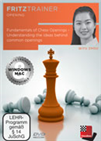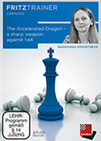Prodigious
 Maia Chiburdanidze had become the youngest-ever women’s world champion in 1978, when, at 17, she beat Nona Gaprindashvili 8½:6½ in a match played in Pitsunda, Georgia. 32 years later, Hou Yifan broke that record when she got the title on 2010 Christmas Eve after beating Ruan Lifei in the final of the Women’s World Championship knockout tournament played in Hatay, Turkey.
Maia Chiburdanidze had become the youngest-ever women’s world champion in 1978, when, at 17, she beat Nona Gaprindashvili 8½:6½ in a match played in Pitsunda, Georgia. 32 years later, Hou Yifan broke that record when she got the title on 2010 Christmas Eve after beating Ruan Lifei in the final of the Women’s World Championship knockout tournament played in Hatay, Turkey.
Hou almost won the title two years earlier, when she lost the final of a similar tournament against Alexandra Kosteniuk in Nalchik, Russia. After becoming world champion in 2010, FIDE decided to interpolate a match for the World Championship after each knockout tournament — which also granted the women’s world champion title.
In 2011, 2013 and 2016, Hou defended her title in matches against Humpy Koneru, Anna Ushenina and Mariya Muzychuk — she played in the 2012 knockout event, but did not take part in the 2014 edition of the 64-player tournament.
It was a strange format, with FIDE claiming that calling the knockout tournament a World Championship event increased the likelihood of getting better sponsorship deals. Hou, naturally, was not satisfied with the format, as she was stripped off her title every other year despite being clearly the strongest woman player in the world — Judit Polgar retired in 2014 and, anyway, did not participate in the women’s cycle.
 Starting out in chess is difficult, and this DVD aims to reduce that stress. Designed for beginner levels in openings, a brief introduction to the reasons we play some of the most common moves in popular openings like the Spanish and Sicilian is given.
Starting out in chess is difficult, and this DVD aims to reduce that stress. Designed for beginner levels in openings, a brief introduction to the reasons we play some of the most common moves in popular openings like the Spanish and Sicilian is given.In 2016, the Chinese star announced that she was dropping out of the cycle, and explained her reasoning in an interview with Frederic Friedel:
Basically it should be held like the men’s World Championship. [...] This is the way the World Championship was handled for most of chess history. However, if FIDE says it is too complicated or too difficult to find sponsors, I have a very simple solution: keep the current system, exactly as it is, or even extend it, as in the men’s Grand Prix, so that more women players can participate. But there should be one important difference: the lucky winner, at the end of the cycle, is not the new Women’s World Champion but the Challenger. She gets the right to play the reigning Women’s World Champion in a ten-game match.
Hou had repeatedly proposed these changes to FIDE, and only decided to quit the cycle once she was sure she had the right to raise those demands:
I have shown my performance in the different tournament formats, including knockout, closed tournaments and matches, for the past six years, and now is the time to make a change. I have had this idea for a long time, but until now I kept thinking to myself “you are not strong enough to ask for changing the system”.
In 2018, FIDE President Arkady Dvorkovich announced that the women’s cycle would follow a system similar to the one seen in the open championship. In the next cycle, Aleksandra Goryachkina won the Candidates Tournament, held in June 2019, and was defeated by Ju Wenjun in the 2020 World Championship match.
Meanwhile, Hou received the prestigious Rhodes Scholarship at the Blavatnik School of Government in Oxford University and went on to become the youngest-ever full professor at the University of Shenzhen.
Hou has not completely quit competitive chess, though, as she recently won the ‘Belt and Road’ rapid tournament and helped China win the inaugural Nations Cup. She has also kept the first spot in the women’s world ranking — she is currently 65 points ahead of second-placed Goryachkina.
 The aim of this course is to help you understand how to make tactical opportunities arise as well as to sharpen your tactical vision - these selected lectures will help to foster your overall tactical understanding.
The aim of this course is to help you understand how to make tactical opportunities arise as well as to sharpen your tactical vision - these selected lectures will help to foster your overall tactical understanding.
Hou Yifan at the University of Shenzhen | Photo: mp.weixin.qq.com
Facing a tireless fighter
Hou’s rival in the final of the 2010 Championship was Ruan Lufei, who was 23 years old at the time. Ruan reached the final after winning each one of her matches in rapid playoffs — she beat defending champion Alexandra Kosteniuk in the round-of-16 and knocked out Harika Dronavalli and Zhao Xue in the last two stages before the final.
On the other hand, Hou had only needed to play rapid tiebreakers in one of her matches, against Zhu Chen in the round-of-16. The eventual champion eliminated Kateryna Lagno and Humpy Koneru in the next two stages — Humpy was the highest-rated player in the field, but was seeded second as Kosteniuk was granted the top seed as the reigning champion.
In the final, Hou, who was the rating favourite and came from beating rivals more quickly than her opponent, missed a big chance to win the first game of the final. Out of a Caro-Kann with 4.f3, Ruan faltered by playing a pawn break on move 24:
 After 1.e4 c5 2.Nf3 Nc6 3.d4 cxd4 4.Nxd4 g6! leads to the so-called "Accelerated Dragon Defense". On this DVD the Russian grandmaster and top women player Nadezhda Kosintseva reveals the secrets of her favourite opening.
After 1.e4 c5 2.Nf3 Nc6 3.d4 cxd4 4.Nxd4 g6! leads to the so-called "Accelerated Dragon Defense". On this DVD the Russian grandmaster and top women player Nadezhda Kosintseva reveals the secrets of her favourite opening.
24...c5 was a mistake as it allowed 25.Bxg7. Black counted on 25...Bf4 26.Nhf3 Rxd2 27.Nxd2 Bxd2 28.Qxd2 Kxg7, but after 29.Qc3+ White has a clear advantage:
The game continued 29...Kh7 30.Qxc5 Qxc5+ 31.Rxc5 and Hou had the superior position. The Chinese teenager was not very accurate from that point on, however, and her opponent saved a 73-move draw in the end. Remember that this was the last stage of an excruciatingly long and highly tense tournament.

Hou redeemed herself by winning the next game with black, converting her 2-pawn advantage in a rook endgame. A draw in game 3 was followed by a win on demand from Ruan, which meant the match would be decided in the 4-game rapid playoff (and Armageddon, if necessary).
The final report of the match thus described Hou’s victory on Christmas Eve:
Many a player would have been seriously rattled by that loss in the fourth game, but whether a tribute to her strength of character, or the typical ability of youth to forget yesterday’s disappointments, 16-year-old Hou Yifan was her impeccable self today, and relentlessly took advantage of her opponent’s mistakes.
Hou won both her rapid games with white to become the youngest-ever women’s world chess champion.

All games of the Final (with expert analysis by GM Elshan Moradiabadi)
Links


















 Maia Chiburdanidze had become the youngest-ever women’s world champion in 1978, when, at 17, she beat Nona Gaprindashvili 8½:6½ in a match played in Pitsunda, Georgia. 32 years later, Hou Yifan broke that record when she got the title on 2010 Christmas Eve after beating Ruan Lifei in the final of the Women’s World Championship knockout tournament played in Hatay, Turkey.
Maia Chiburdanidze had become the youngest-ever women’s world champion in 1978, when, at 17, she beat Nona Gaprindashvili 8½:6½ in a match played in Pitsunda, Georgia. 32 years later, Hou Yifan broke that record when she got the title on 2010 Christmas Eve after beating Ruan Lifei in the final of the Women’s World Championship knockout tournament played in Hatay, Turkey.




